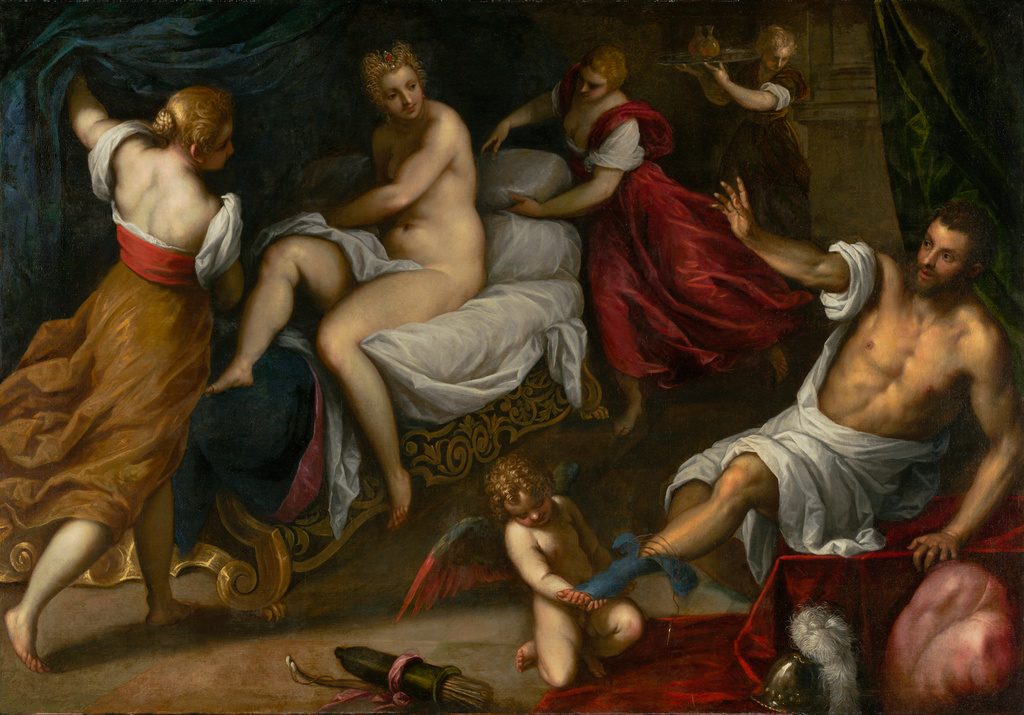While it may not seem all that important at first glance to learn about how the days of the week got their names, it is actually very important from a cultural perspective. As many of the weekdays are named after the gods of various religions, we can learn much about the religious practices of certain cultures by analyzing why and how certain gods and goddesses were associated with certain days. Religion and culture are closely intertwined to the point where the English words culture and cult are derived from the same word. Studying a culture’s religion can provide insight into how inhabitants of that culture thought and how they viewed the world.
The word Sunday is, appropriately enough, named after the sun. 1 Specifically, it is derived from the Old English word sunnandæg. Sunnandæg itself is the combination of two words, sunnen, which means “sun,” and dæg, which means “day.”2
The word Monday is derived from the Old English word monandæg, which combines two other Old English words: mona, which means “moon,” and dæg, which, as mentioned above, means “day.” In this respect, Monday is much like the word Sunday in that Monday references the moon whereas Sunday references the sun.3
The word Tuesday is derived from the word Tysdagr, which references the god Tyr. Tyr, also rendered as Tiw or Tiu, is the Norse god of war and justice. The words for Tuesday in other languages also reference other gods of war from various mythologies. For example, in Latin, the word for Tuesday is dies Martis, which means “day of Mars.” Mars is Tyr’s counterpart in the Roman pantheon, being the god of war for the Romans, as well as “protector of Rome.” 4
Wednesday is derived from the Old English word wodnesdæg, referencing the god Woden.5 Woden is also known as Wodan and Wotan, but he is most commonly known by the name of Odin. Due to the multiple different “archaeological and literary sources” surrounding Odin, it is hard to tell what “his exact nature and role” was in the Norse pantheon, though much like Tyr, he is a god of war and poets, as well as the “protector of heroes.” He is commonly depicted as a one-eyed elderly man with “a flowing beard.” In Latin, the name for Wednesday is dies Mercurii, referencing the Roman god Mercury, who Odin was identified as by the Roman historian Tacitus.6 Mercury, also known as Mercurius, is the Roman “god of shopkeepers and merchants, travelers and transporters of goods, and thieves and tricksters.” He is often considered the Roman counterpart to the Greek god Hermes and both have a role as messenger within their respective pantheons.7
Thursday is derived from “Thor’s-day,” referencing the name of Thor, Norse god of thunder.8 Thor is commonly depicted in Norse mythology as an extremely strong, red-haired, “great warrior,” and the son of Odin in some traditions. He possessed a magical hammer named Mjollnir and is fated to die while killing “the world serpent Jormangund” during the Ragnarok, the destruction of the “world of gods and men” in Norse mythology. The Latin term for Thursday is dies Jovis, which means “Jove’s day” and references Jupiter/Jove, the head Roman god that “Thor was sometimes equated with.”9

c. 1670 or 1680-1700 | Courtesy Getty Gateway Images
The word Friday is derived from “Frigg’s-day,” which references the name of the Norse goddess Frigg, also known as Freya, Frea, or Friia. Frigg is Odin’s wife and patron of love, specifically “marriage and fertility.”10
The word Saturday is derived from the Middle English word saterday and the Old English word sæterndæg, the latter referencing Saturn of Roman mythology. Saturn, also called Saturnus in Latin, was the Roman god of “sowing and seed.” He is also identified as Cronus, one of the Greek Titans and father of Zeus. Zeus drove Saturn/Cronus out of Mount Olympus, but Saturn is also said to have given “his people agriculture and other peaceful arts” and “ruled Latium” during a peaceful and prosperous “golden age.”11
Even today, religion has an effect on our culture. Whether it is through our overall sense of morals or through the expressions and idioms we use, religion and religious practice often affect how we think, even if we are not consciously aware of it. How much more would religion have affected older cultures, many of whom were more openly pious than ours? As American culture puts an emphasis on multiculturalism, it is colored by other cultures and often takes aspects of them into itself. Therefore, through understanding other cultures, we can learn more about our own.
- Encyclopedia Britannica, 2016, s.v., “Week.” ↵
- “Sunday | Definition of Sunday by Merriam-Webster,” Merriam-Webster, accessed November 18, 2016, http://www.merriam-webster.com/dictionary/Sunday. ↵
- “Monday | Definition of Monday by Merriam-Webster,” accessed November 18, 2016, http://www.merriam-webster.com/dictionary/Monday. ↵
- Encyclopedia Britannica, 2016, s.v., “Tyr.” ↵
- “Wednesday | Definition of Wednesday by Merriam-Webster,” Merriam-Webster, accessed November 18, 2016, http://www.merriam-webster.com/dictionary/Wednesday. ↵
- Encyclopedia Britannica, 2016, s.v.,“Odin.” ↵
- Encyclopedia Britannica, 2016, s.v.,“Mercury.” ↵
- Encyclopedia Britannica, 2016, s.v.,“Week.” ↵
- Encyclopedia Britannica, 2016, s.v., “Thor.” ↵
- Encyclopedia Britannica, 2016, s.v., “Frigg.” ↵
- Encyclopedia Britannica, 2016, s.v., “Saturn.” ↵



66 comments
Samantha Zamorano
I did not expect to find an article such as this one! I have actually never thought about the origin of the names of the days of the week and I feel like many people might not also, so thank you for bringing more information to light. I also never thought about how these days of the week are so deep in culture, and you really demonstrated that by listing out the gods and explaining where the words derived from. I am not too knowledgeable on gods, so this definitely helped me. A question I have for you is, do you think it is important to teach this history in school when learning about the weekdays when we’re young? Or perhaps at a later time when we’re more able to comprehend what is being said?
Nooraldeen Aldrees
It is interesting to think about the etymology of weekdays. It is funny that that all nowadays weekdays are derived from Greek and Roman gods, even though nobody believes in those gods anymore -other than many of comic books-. However, apparently humanity was less concerned of changing these names to what is corresponding to their believe system. I wonder what other cultures such as East Asian countries – such as China and Japan- have named their weekdays based on what idea. This question can extend to other cultures, such as Indians, African, Persian, Arabian, or Russian. I would believe that they have different etymological background for their weekday’s names. Also, what is interesting that there appear to be a universal agreement -as far as I am aware- on the concept of having seven reoccurring names for days. Why it is not eight, nine, or ten? This would be a good topic to consider researching too..
Nooraldeen Aldrees
It is interesting to think about the etymology of weekdays. It is funny that that all nowadays weekdays are derived from Greek and Roman gods, even though nobody believes in those gods anymore -other than many of comic books-. However, apparently humanity was less concerned of changing these names to what is corresponding to their believe system. I wonder what other cultures such as East Asian countries – such as China and Japan- have named their weekdays based on what idea. This question can extend to other cultures, such as Indians, African, Persian, Arabian, or Russian. I would believe that they have different etymological background for their weekday’s names. Also, what is interesting that there appear to be a universal agreement -as far as I am aware- on the concept of having seven reoccurring names for days. Why it is not eight, nine, or ten? This would be a good topic to consider researching too.
Roberto Rodriguez
It is really interesting that the days of the week were influenced by Norse mythology. It is just not the first thing that comes to mind when I think of societies/culture that has influenced us today. I usually think of Rome or Greek, but never really Norse. Nonetheless this was a very interesting topic that I never thought twice about the naming of the days of the week, informative and great article!
Antonio Coffee
What really stuck out to me is that many of the days had origins in Norse mythology and their gods. I was not surprised to see representation from the Latin and Roman gods as this is where a lot of influence on western culture comes from. The Norse gods are usually more ignored in the larger cultural perspective and it surprised me. It was interesting to see that one day of the week came from a middle eastern culture and that it seemed almost a bit random.
Matthew Swaykus
It is certainly interesting looking at how much the cultural history of England differs from that of Spain or other European Cultures. England inhabited and invaded many times by a wide variety of groups throughout its early history. From the Celts settlement to Roman expansion, and from Anglican fortification from Danish plunder, England has seen a far share of cultural practices and traditions that can still be seen to this day.
Diego Terrazas
I have always wondered how the names of the days of the week were created. I never would have guessed most of the originated from Norse mythology. I really like the last two sentences of this article, it aligns with the whole melting pot aspect of the United States where we must understand multiple cultures to understand our won American culture.
Eric Ortega Rodriguez
We use the names of the days daily. When looking at test dates, planning schedules, and when managing one’s agenda. So it was fascinating to read on where these names came from. I was shocked to learn that the names originate from the names of gods and goddesses. An example of this being Wednesday is dies Mercurii, referencing the Roman god Mercury. Overall, this article was fascinating and very well written. Great work.
Engelbert Madrid
This is quite an interesting article to read, because I have never given a thought on the meaning of each weekday and the words that we use in our daily basis. As a matter of fact, I found it interesting that words basically have a history on how they originated in a language. Furthermore, this article proves that religion and culture relate to each other in some ways.
Valeria Perez
I had never thought about the origins of the names of the week. I never expected the names to derive from so many different civilizations. Though it is easy to remember that things such as our justice system and moral ideas come from ancient civilizations we forget how their culture affects our everyday life in simple things like the days of the week.